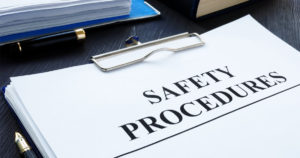Workers’ Rights to a Safe Workplace
February 17, 2021 Federal law as per the Occupational Safety and Health Administration (OSHA) prescribes that every worker is entitled to a safe workplace. Despite the large number of safety and health standards that are in place, the Bureau of Labor Statistics (BLS) reported that 2.8 million workers were non-fatally injured in 2019 and that 5,333 died. The nonfatal injury rate has remained unchanged for the last four years, whereas the fatal injury rate has increased by approximately 2%.
Federal law as per the Occupational Safety and Health Administration (OSHA) prescribes that every worker is entitled to a safe workplace. Despite the large number of safety and health standards that are in place, the Bureau of Labor Statistics (BLS) reported that 2.8 million workers were non-fatally injured in 2019 and that 5,333 died. The nonfatal injury rate has remained unchanged for the last four years, whereas the fatal injury rate has increased by approximately 2%.
Not only do workers have the right to a safe workplace, but they have other rights as well. Review our list below to learn more.
Employee Rights
Workers across every industry are equally entitled to a workplace free from recognizable hazards. According to the BLS, injury rates are higher for workers in certain fields. For example, individuals who work as nursing assistants, tractor-trailer and other heavy truck drivers, laborers and freight, stock, and material movers, light truck drivers, and construction workers incur higher injury rates than workers in other positions. However, maintenance and repair workers, stockers and order fillers, janitors and cleaners, registered nurses, and retail salespersons sustain fairly high injury rates each year as well.
Safety and health failures happen in workplaces every day. An employer may fail to ensure that the jobsite has been inspected for recognizable hazards like fall risks, chemical exposure dangers, or unguarded or defective machinery. Accidents do happen; some employers mistakenly overlook a danger but there are others out there who routinely cut corners to save on costs and who refuse to put the health and safety of their employees first. Industrial safety and health failures directly endanger workers and are the cause behind thousands of preventable injuries annually.
Every worker has the right to speak up and file a jobsite hazard report without the fear of retaliation from his or her employer. OSHA’s guidelines dictate that workers are also legally entitled to:
- Receive workplace health and safety training in a language the worker understands
- Receive all the necessary safety equipment for a job. Examples of safety equipment that workers should receive includes harnesses or lifelines to reduce fall risks and personal protective equipment (PPE) such as eye protection, gloves, and respirators
- Be protected from exposure to toxic chemicals
- Request an OSHA inspector to investigate hazards as well as speaking directly to the inspector
- Review company records of work-related incidents, illnesses, and injuries that have occurred
- Report an injury or illness and get copies of medical records
- Review results of tests taken to identify workplace hazards
When it comes to personal protective equipment, most OSHA standards require employers to provide it. While there are a few exceptions, in general employers must protect workers from job-related illnesses and injuries by paying for gloves, hard hats, goggles, safety glasses, welding helmets, face shields, chemical protective equipment and fall protection equipment.
Filing a Complaint
Chances are, an employee is going to notice what safety hazards are present on the job before his or her boss does. This is why workers get injured and not their employers: because the workers come into direct contact with safety and health dangers daily. So long as a worker makes a claim in good faith, he or she is legally protected from retaliation for filing a complaint. These legal protections are in place for workers whether they made an internal claim to the company or to an outside agency like OSHA. It is illegal for an employer to fire, demote, transfer, or otherwise retaliate against a worker who files a safety and health complaint. Workers who are victims of employer retaliation have the option to file a whistleblower complaint with OSHA.
Employees can confidentially file a safety and health complaint to request an inspection of their workplace. The form asks for basic information, such as:
- A description of the hazard(s)
- The location (e.g. building or worksite) where the violation is present
- Whether the worker brought the condition to the attention of the employer or an outside agency
- The worker’s employment status (e.g. former employee, current employee, an employee representative, etc.)
If your employer violated your rights or you were injured as a result of safety and health failures in your workplace, someone at our firm can help. Contact a representative online now.
Philadelphia Workers’ Compensation Lawyers at Galfand Berger, LLP Representing Injured Workers Since 1947
Galfand Berger LLP has offices located in Philadelphia, Bethlehem, Reading and Lancaster, we serve clients throughout Pennsylvania and New Jersey. To schedule a consultation, call us at 800-222-8792 or complete our online contact form.
 Google Screened
Google Screened
